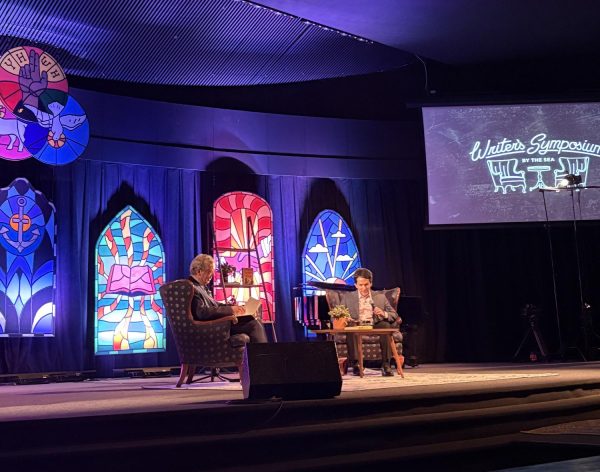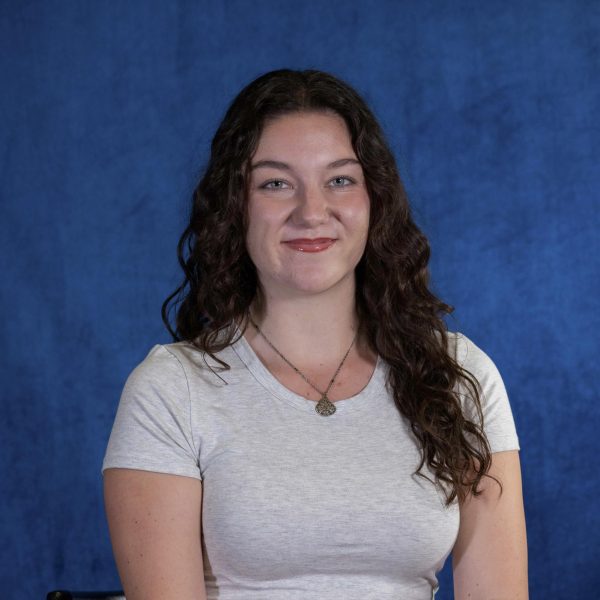Looking ahead with an open heart
At The Writer’s Symposium, I sat among an audience ranging from adolescents to elderly folks at the Brown Chapel of Point Loma Nazarene University to listen to Mitch Albom’s lessons on what it means to be a human and how to find success in humility. Fresh after revisiting “Tuesdays with Morrie,” I eagerly took this opportunity to see my favorite author in the flesh; little did I know I would leave the chapel with a newfound belief in giving voice to the unheard and the wisdom we can gain from everyone, regardless of their age.
Alongside “Tuesdays with Morrie,” the Q&A covered several other works of his. I was particularly touched by the backstory of “Finding Chika,” a book about a little girl Albom and his wife took into their orphanage in Haiti. Albom prefaces the book on page one by telling readers that Chika’s story is not just about a girl who passed — it is about a girl who lived. Albom compassionately recounts the wisdom he took from her existence as not only his daughter but also his inspiration. Ultimately, their time together shows how we can form relationships that keep each other alive through stories long after our time on Earth has come to an end.
As I began to internalize this story and listen to Albom detail his many past occupations, I realized that the way I view my future, while rational, is too limited. Albom helped me realize that I can gain more from life if I take advantage of all opportunities to live in service of others, opening up more options than the few conceptions of a prosperous career I previously had. Albom is not only a journalist — he is a musician, an author, and a person who became devoted to aiding others in strife. Though I originally planned to pursue the conventional path of graduate school and a traditional career, listening to Albom helped free me from my tunnel vision.
If you asked younger me what I wanted to be in the future, I would have said, “I just want to help people” — I want to bring this truth about myself back into my everyday life because it is one that remains real no matter the path I decide to take. While I plan on pursuing graduate school, I want to adjust my mindset to fill my cup by also immersing myself in music, art, and culture that I love and the people I treasure, just as Albom advises his audience.
“We are defined by who and what we carry,” Albom said, and I have never agreed with anything more. I want to be defined by my relationships and the hearts of people I have touched, not necessarily by any prestigious degree I hold. That night, I left the auditorium inspired to live each day strengthening these connections by reminding myself of the pearls of wisdom I was given by Mitch Albom.
– Lina Mauk, Staff Writer
In pursuit of great storytelling
As Morrie Schwartz, the beloved sociology professor of “Tuesdays with Morrie,” laid in bed just three days before his passing, he shared his last wishes with author Mitch Albom: That when Albom visits his gravesite, he would lay down a picnic blanket and tell him more stories. Tears began to well as I imagined Albom sitting beside Morrie’s grave drafting his first memoir, asking him if the syntax sounded right, knowing that Morrie would never get the chance to read it. The book was supposed to be small — the publishing company only printed 20,000 copies — but Morrie’s wisdom touched the lives of readers around the globe and transformed the trajectory of Albom’s life.
Before the success of “Tuesdays with Morrie,” Albom had dreams of becoming a musician. After leaving his seemingly perfect gig performing in Greece, he pranced around New York City, playing piano at night and writing for a local newspaper during his off time. Albom then returned to school, setting his sights on becoming a features journalist. Instead, he found a permanent place as a sports writer, a position he continues to love to this day. A chance flip of the television channel led him back to Morrie, and after their reconnection, Albom’s values shifted: Every interaction he had, whether big or small, became intertwined in the universal web of life stories. Now, at 66, Albom is finally able to see that the events he experienced over the course of his life were not scattered and isolated, but were meant to be pieced together once he aged into a wiser perspective.
“When you live long enough,” Albom said heavy-heartedly, “you start to figure out how the dots connect.” In a room full of listeners with decades more life experience than myself, I wondered what dots have connected for them and how joy has emerged in their lives. It truly is a gift to grow old, for with age is how you truly learn to tell great stories. For now, as I find the building blocks to create my own house of memories, I just hope to be as open to any wisdom that comes to me, whether from a 78-year-old man like Morrie or a 7-year-old kid like Chika.
At the end of his talk, Albom told the packed auditorium that “death ends a life, but not a relationship.” The familial comfort and love for humanity that Albom exudes through his writing and humanitarian work are a testament to his preservation of memories through the art of storytelling.
– Xuan Ly, A&E Co-Editor













